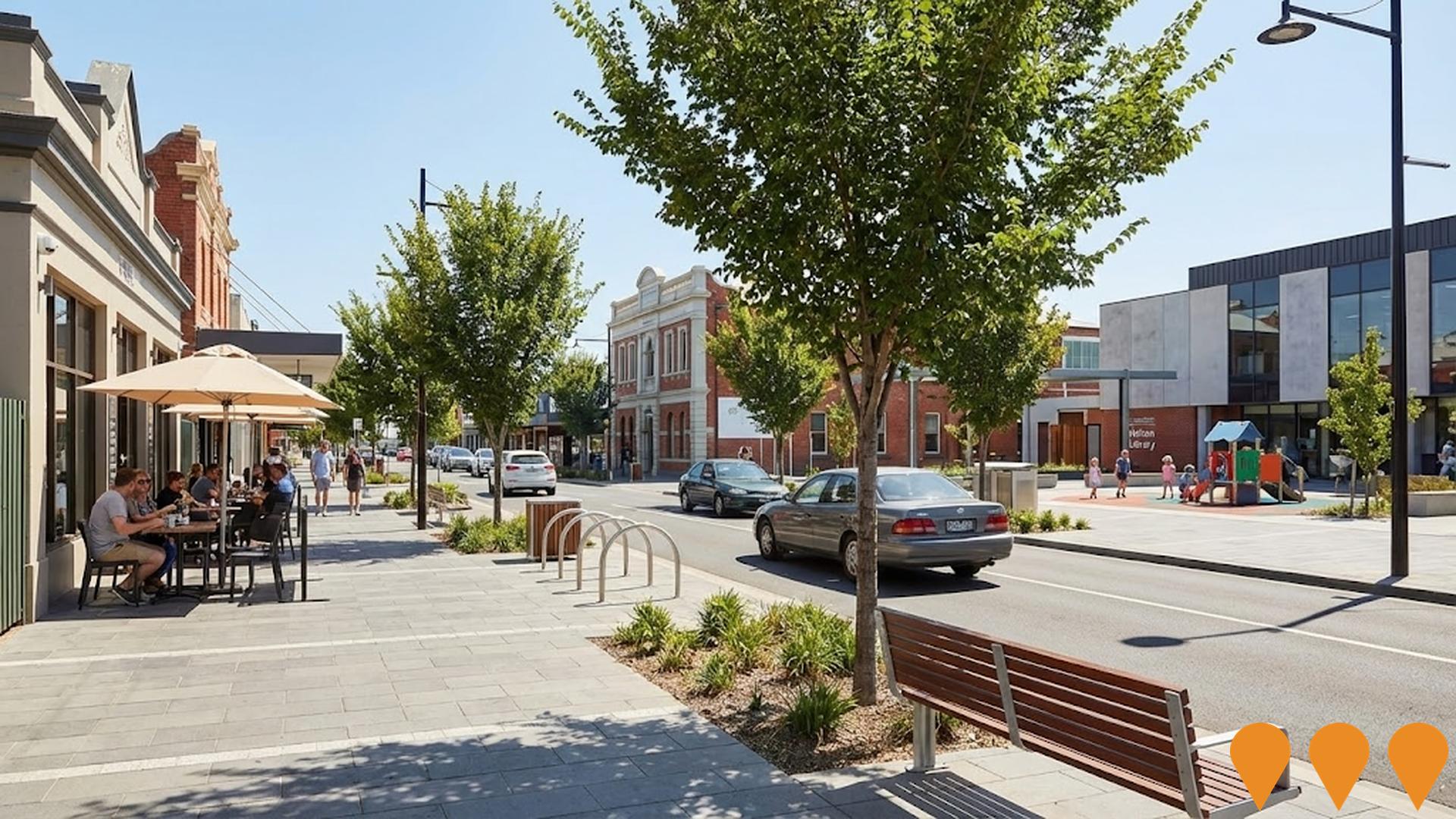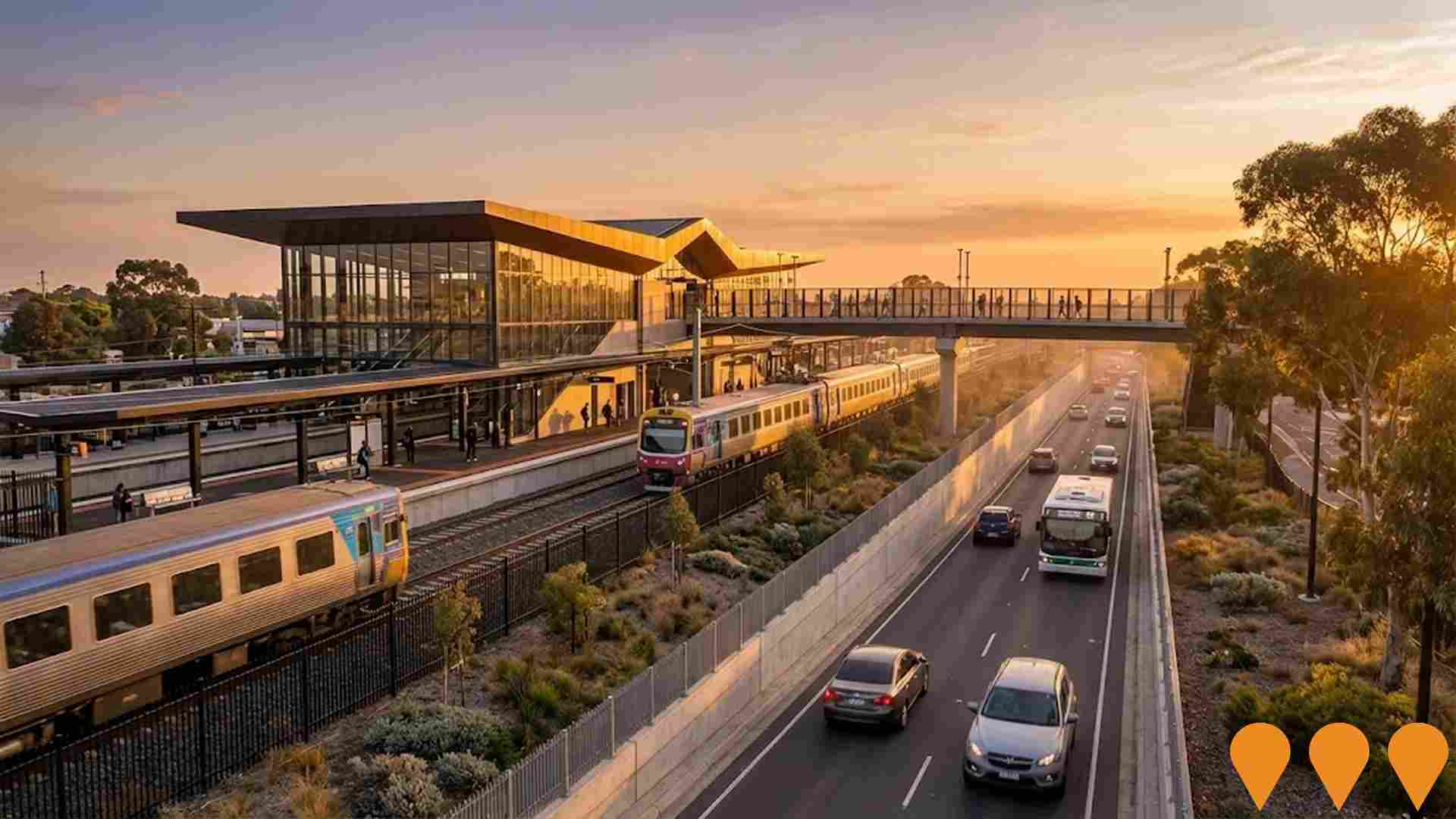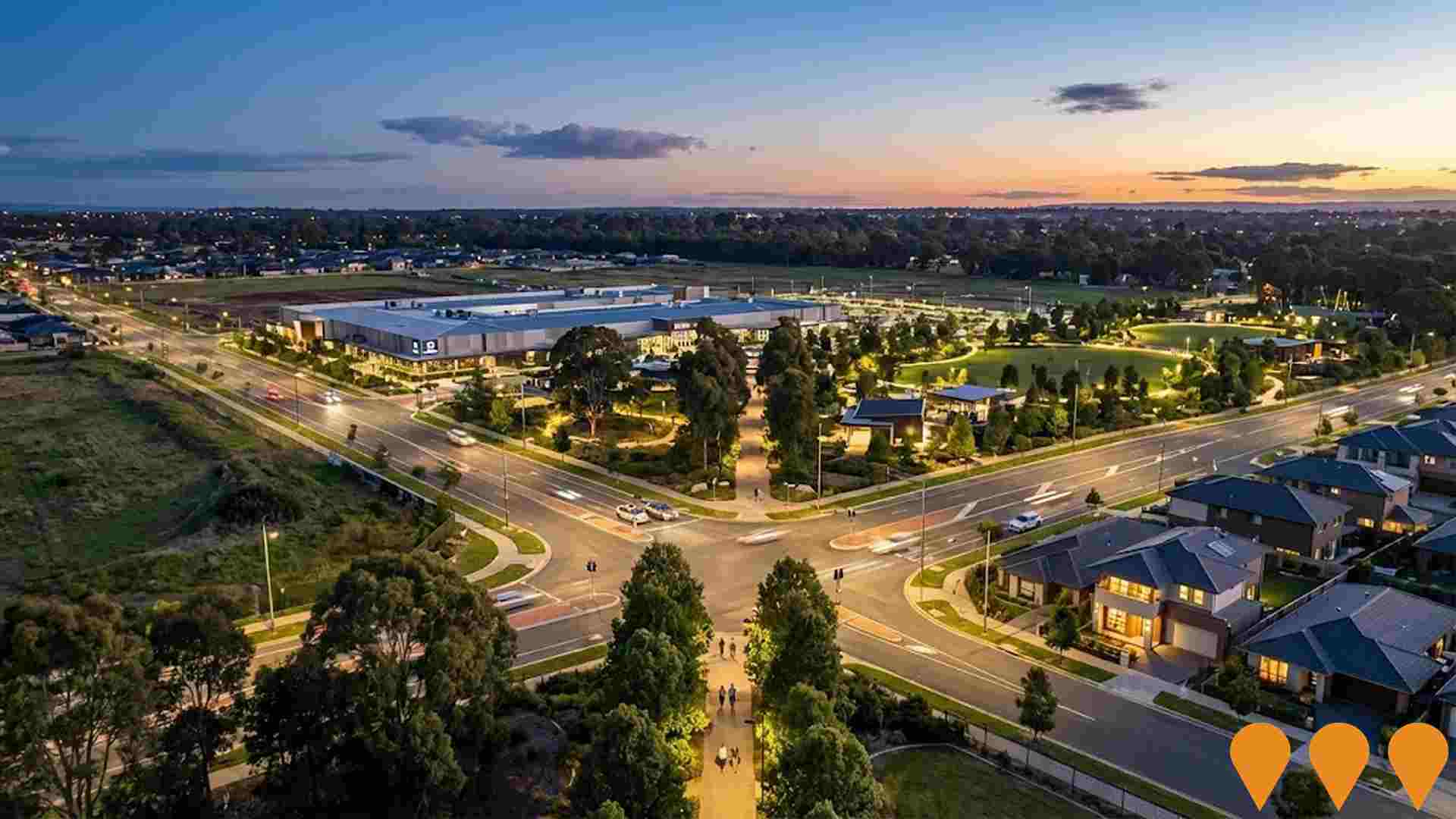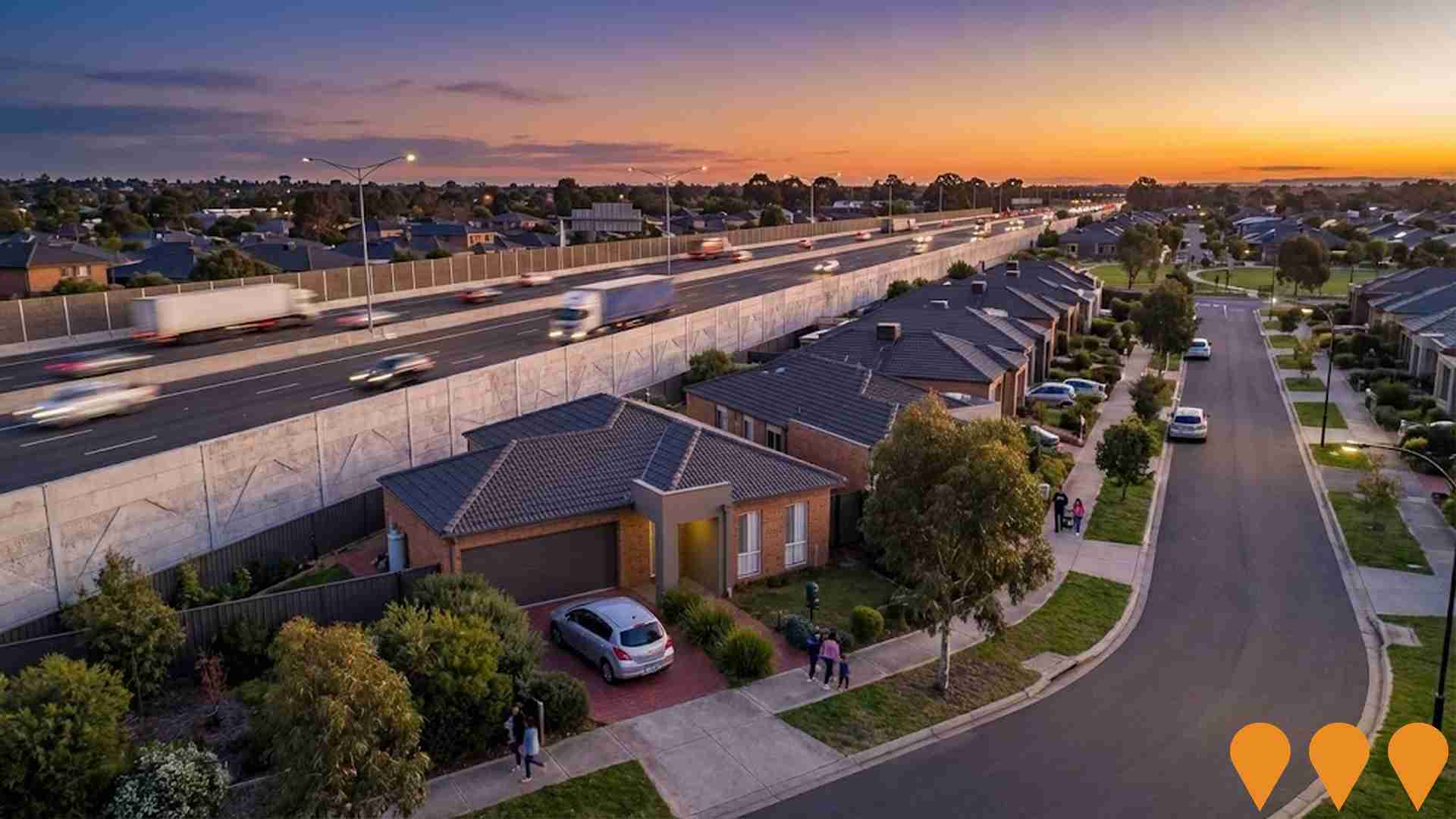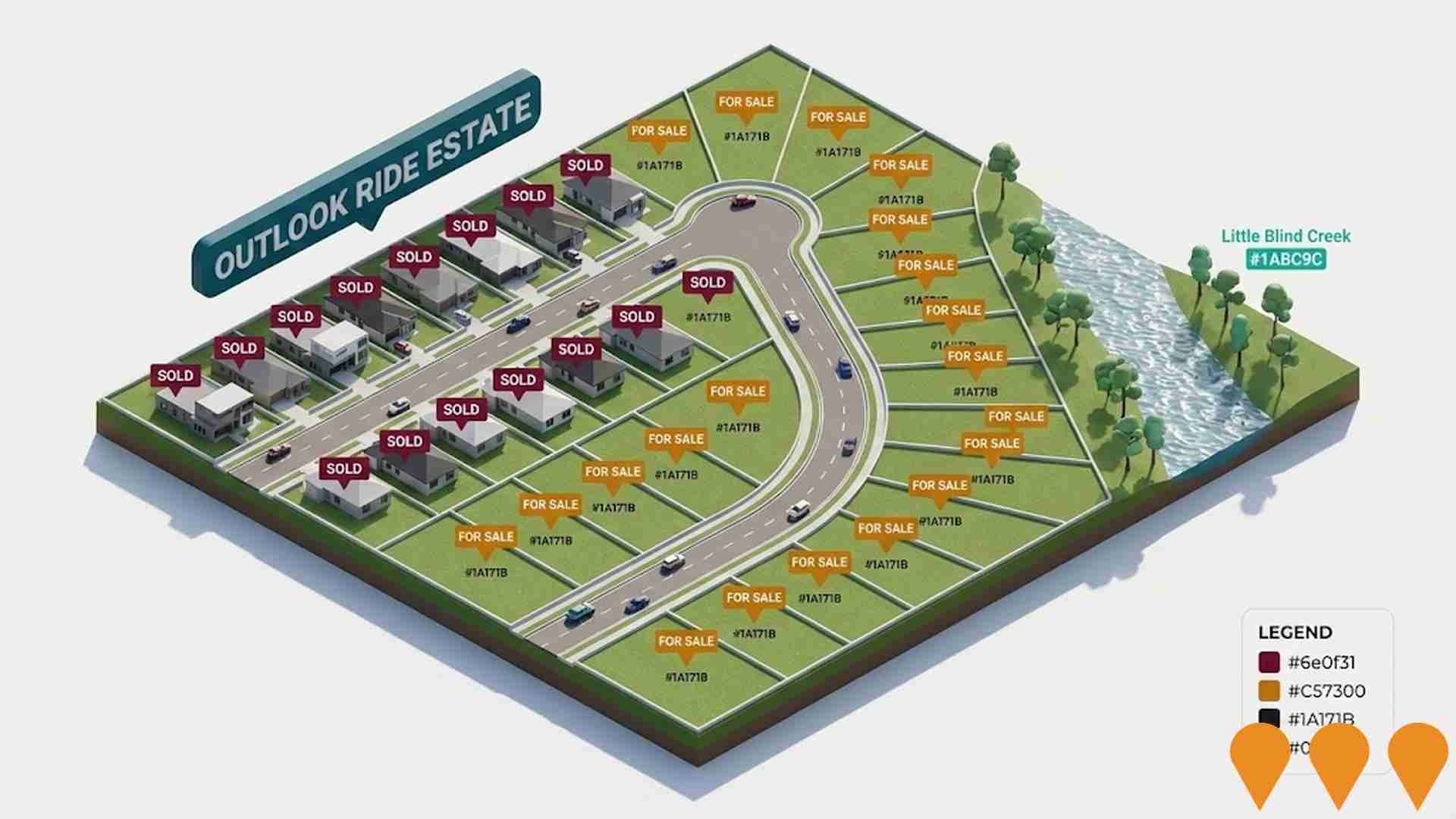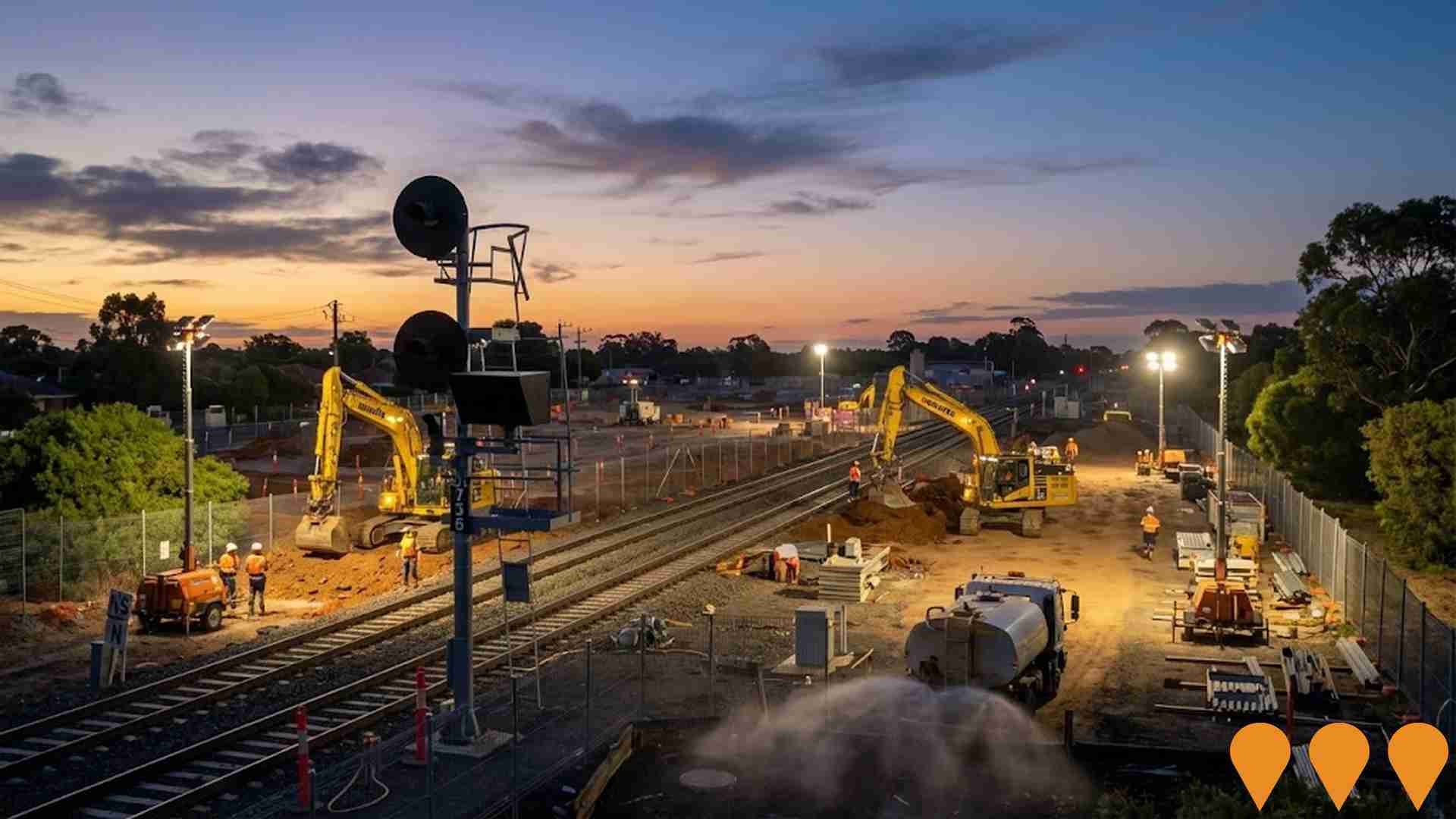Chart Color Schemes
This analysis uses ABS Statistical Areas Level 2 (SA2) boundaries, which can materially differ from Suburbs and Localities (SAL) even when sharing similar names.
SA2 boundaries are defined by the Australian Bureau of Statistics and are designed to represent communities for statistical reporting (e.g., census and ERP).
Suburbs and Localities (SAL) represent commonly-used suburb/locality names (postal-style areas) and may use different geographic boundaries. For comprehensive analysis, consider reviewing both boundary types if available.
est. as @ -- *
ABS ERP | -- people | --
2021 Census | -- people
Sales Activity
Curious about local property values? Filter the chart to assess the volume and appreciation (including resales) trends and regional comparisons, or scroll to the map below view this information at an individual property level.
Find a Recent Sale
Sales Detail
Population
An assessment of population growth drivers in Melton reveals an overall ranking slightly below national averages considering recent, and medium term trends
Melton's population is approximately 8,372 as of November 2025. This figure represents an increase of 486 people since the 2021 Census, which reported a population of 7,886. The change is inferred from the estimated resident population of 8,056 in June 2024 and an additional 252 validated new addresses since the Census date. This results in a population density ratio of 849 persons per square kilometer, comparable to averages seen across other locations assessed by AreaSearch. Melton's growth rate of 6.2% since the census is within 2.7 percentage points of the national average (8.9%), indicating competitive growth fundamentals. Overseas migration contributed approximately 75.3% of overall population gains during recent periods in Melton.
AreaSearch adopts ABS/Geoscience Australia projections for each SA2 area, released in 2024 with a base year of 2022. For areas not covered by this data, AreaSearch uses the VIC State Government's Regional/LGA projections released in 2023, adjusted using a method of weighted aggregation of population growth from LGA to SA2 levels. Growth rates by age group are applied across all areas for years 2032 to 2041. Based on demographic trends and the latest annual ERP population numbers, Melton is projected to experience above median population growth. By 2041, the area is expected to expand by 1,349 persons, reflecting a total gain of 12.2% over the 17-year period.
Frequently Asked Questions - Population
Development
The level of residential development activity in Melton is very low in comparison to the average area assessed nationally by AreaSearch
Melton has seen approximately 12 new homes approved annually over the past five financial years, totalling 62 homes. As of FY-26, 0 approvals have been recorded so far. Despite a decline in population during this period, development activity has been adequate relative to other areas, which is positive for buyers. New properties are constructed at an average value of $283,000, below the regional average, suggesting more affordable housing options.
In FY-26, $5.6 million in commercial development approvals have been recorded, indicating limited focus on commercial development compared to Greater Melbourne, where Melton records 94.0% lower building activity per person. This limited new supply generally supports stronger demand and values for established properties. When measured nationally, Melton's development activity is also below average, reflecting the area's maturity and possible planning constraints. New development consists of 33.0% standalone homes and 67.0% townhouses or apartments, indicating a shift from the area's existing housing composition, which is currently 83.0% houses. This focus on higher-density living creates more affordable entry points for downsizers, investors, and first-home buyers. The estimated population per dwelling approval in Melton is 1147 people, reflecting its quiet development environment. According to the latest AreaSearch quarterly estimate, Melton is projected to add 1,023 residents by 2041.
If current construction levels persist, housing supply may lag population growth, potentially intensifying buyer competition and underpinning price growth.
Frequently Asked Questions - Development
Infrastructure
Melton has very high levels of nearby infrastructure activity, ranking in the top 20% nationally
Changes to local infrastructure significantly impact an area's performance. AreaSearch has identified 18 projects likely to affect the area. Key projects include the Melton Level Crossing Removal Project, Western Freeway Upgrade from Melton to Caroline Springs, Melton Line Upgrade & Cobblebank Stabling Yard, and Melton Suburban Revitalisation. The following list details those most relevant.
Professional plan users can use the search below to filter and access additional projects.
INFRASTRUCTURE SEARCH
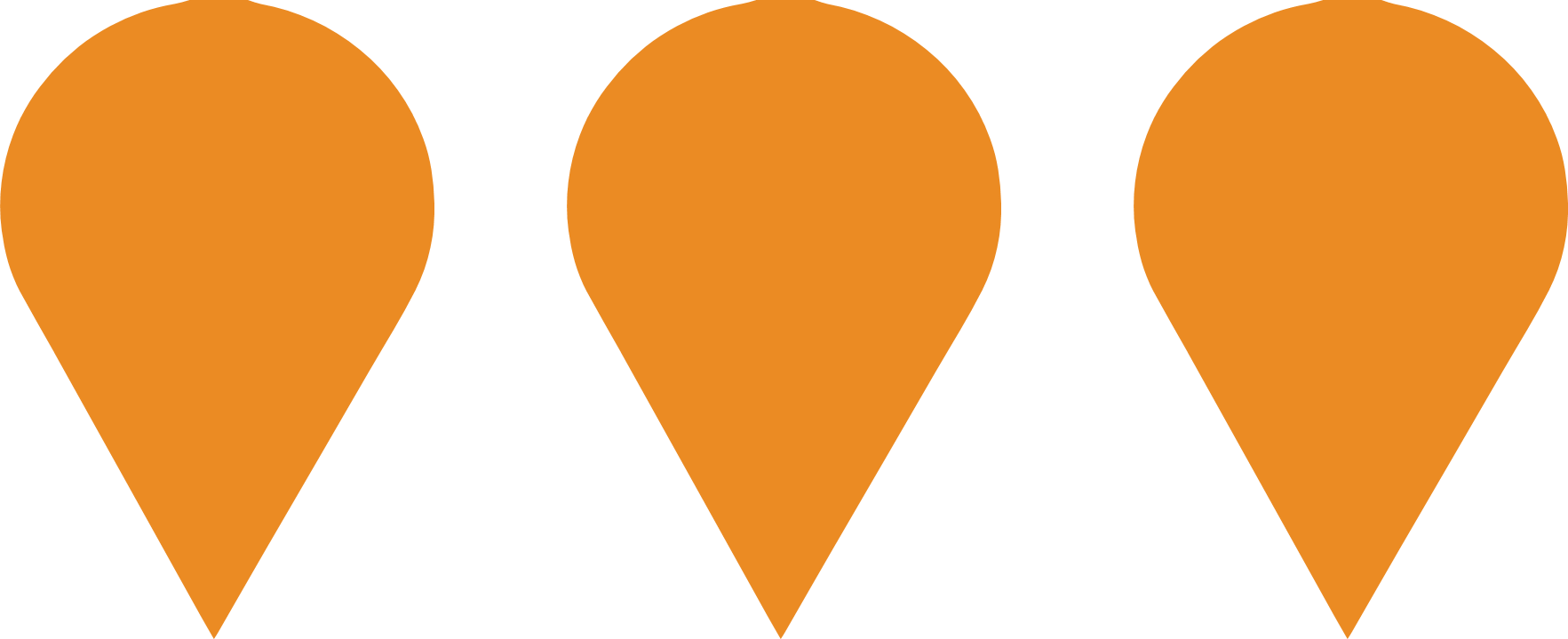 Denotes AI-based impression for illustrative purposes only, not to be taken as definitive under any circumstances. Please follow links and conduct other investigations from the project's source for actual imagery. Developers and project owners wishing us to use original imagery please Contact Us and we will do so.
Denotes AI-based impression for illustrative purposes only, not to be taken as definitive under any circumstances. Please follow links and conduct other investigations from the project's source for actual imagery. Developers and project owners wishing us to use original imagery please Contact Us and we will do so.
Frequently Asked Questions - Infrastructure
Melton East Precinct Structure Plan
A 1,005ha VPA-led precinct structure plan for Melton East to deliver approximately 12,908-14,000 homes (accommodating ~40,000-43,000 residents), local employment, town centres, transport corridors, schools, sports reserves, community facilities and conservation areas along Kororoit Creek. Funded via ICP and Melbourne Water drainage scheme. Draft Amendment C244melt is currently before Planning Panels Victoria (as of Nov 2025) following public exhibition in March 2025, with panel hearings previously scheduled from July 2025.
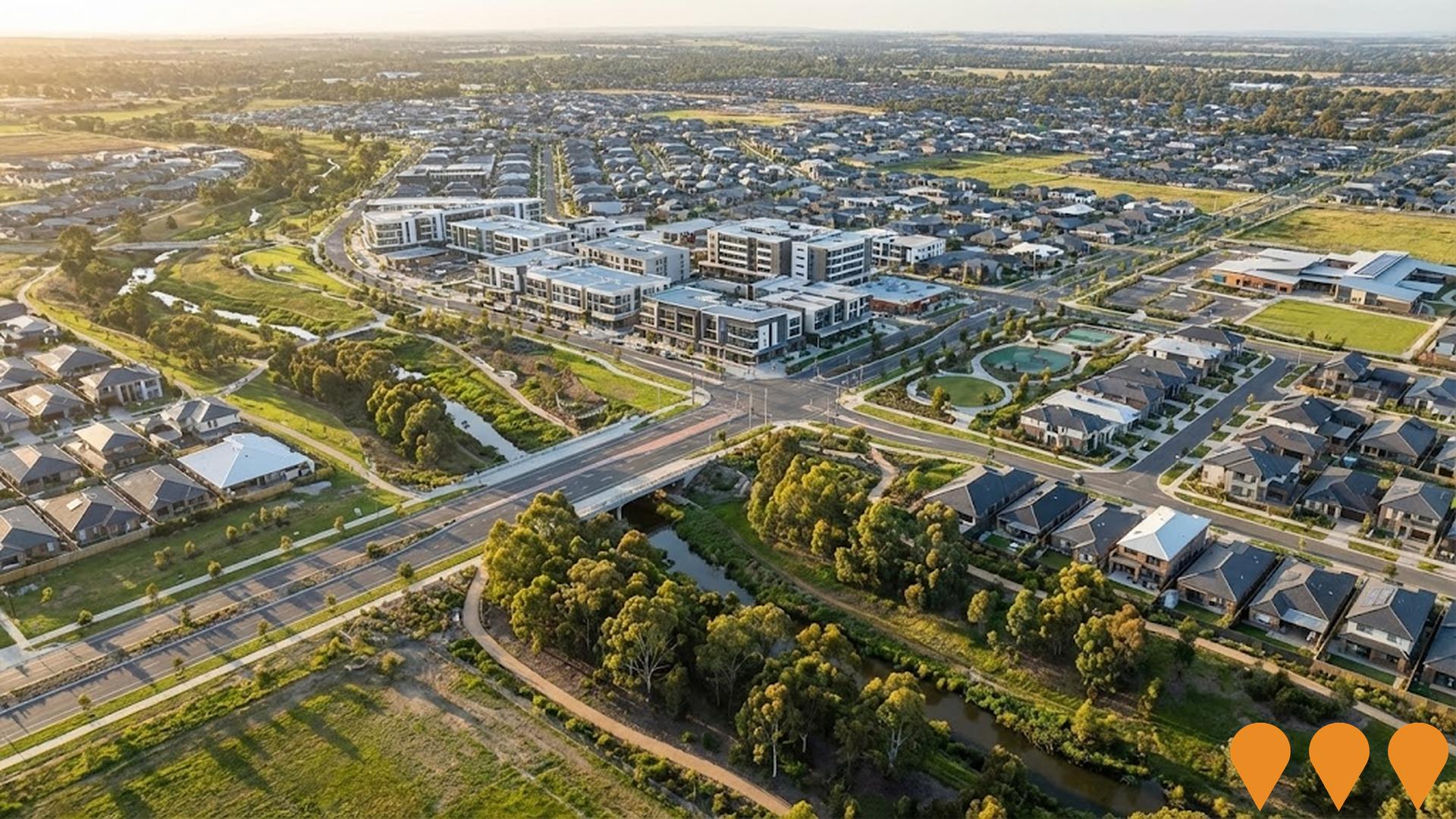
New Melton Hospital
The New Melton Hospital is a major social infrastructure project delivering Victoria's first fully electric public hospital. Located in Cobblebank, the facility will include a 24-hour emergency department, at least 274 beds, an intensive care unit, maternity and neonatal services, mental health services, and a new education and training hub. The project is being delivered as a public-private partnership (PPP) by the Exemplar Health consortium (Capella Capital, Lendlease, Honeywell, and Compass Group). Major construction commenced in July 2025, with the facility expected to treat 130,000 patients annually upon completion.
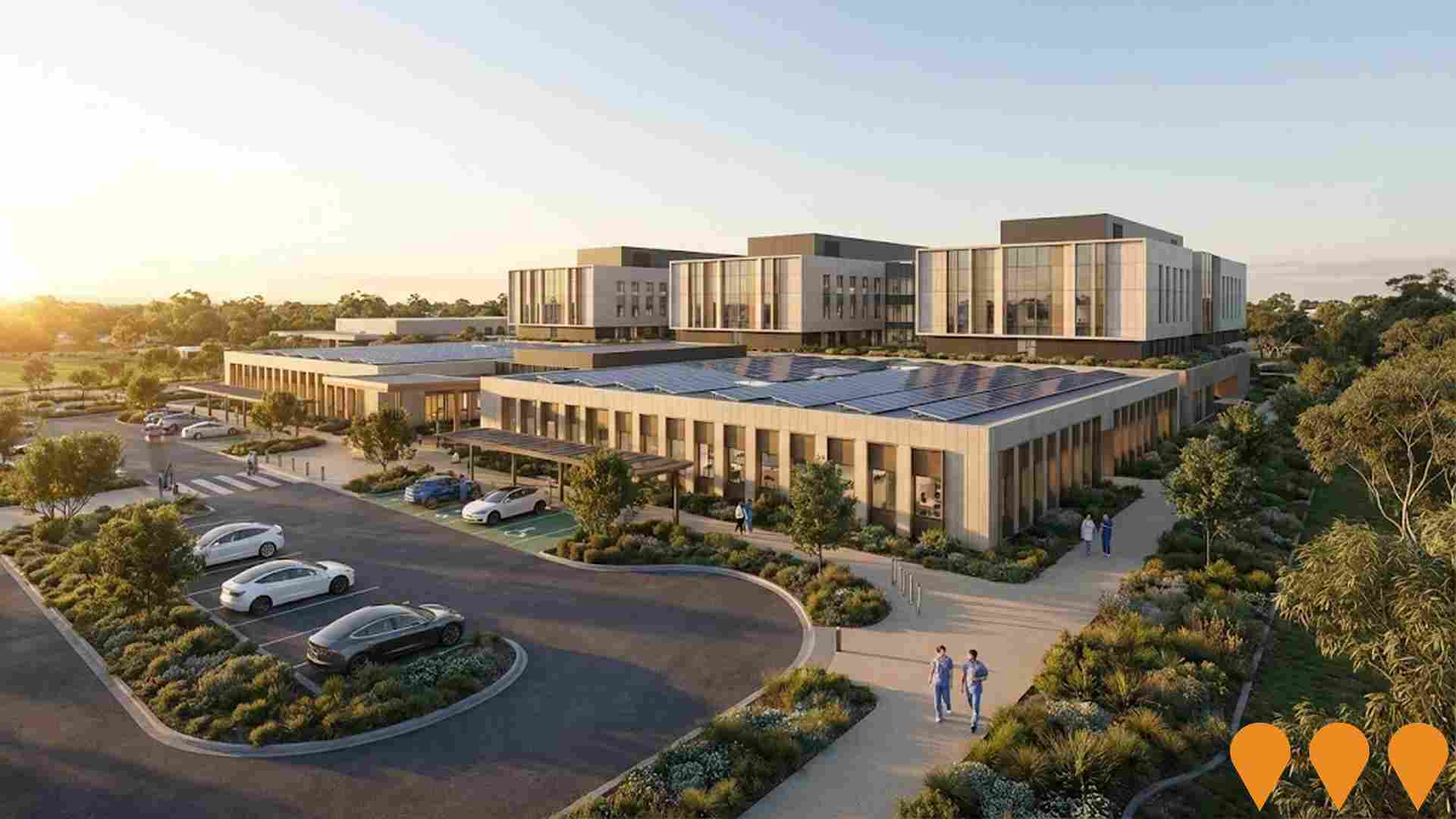
New Melton Hospital
Victoria's first all-electric public hospital in Cobblebank, delivering a 24-hour emergency department, at least 274 inpatient beds, intensive care unit, maternity and neonatal services, mental health services, radiology, ambulatory care, and an education/training hub. Delivered as a Public-Private Partnership by the Exemplar Health consortium for the Victorian Health Building Authority; operated by Western Health. Major construction underway as of mid-2025, with completion scheduled for 2029.
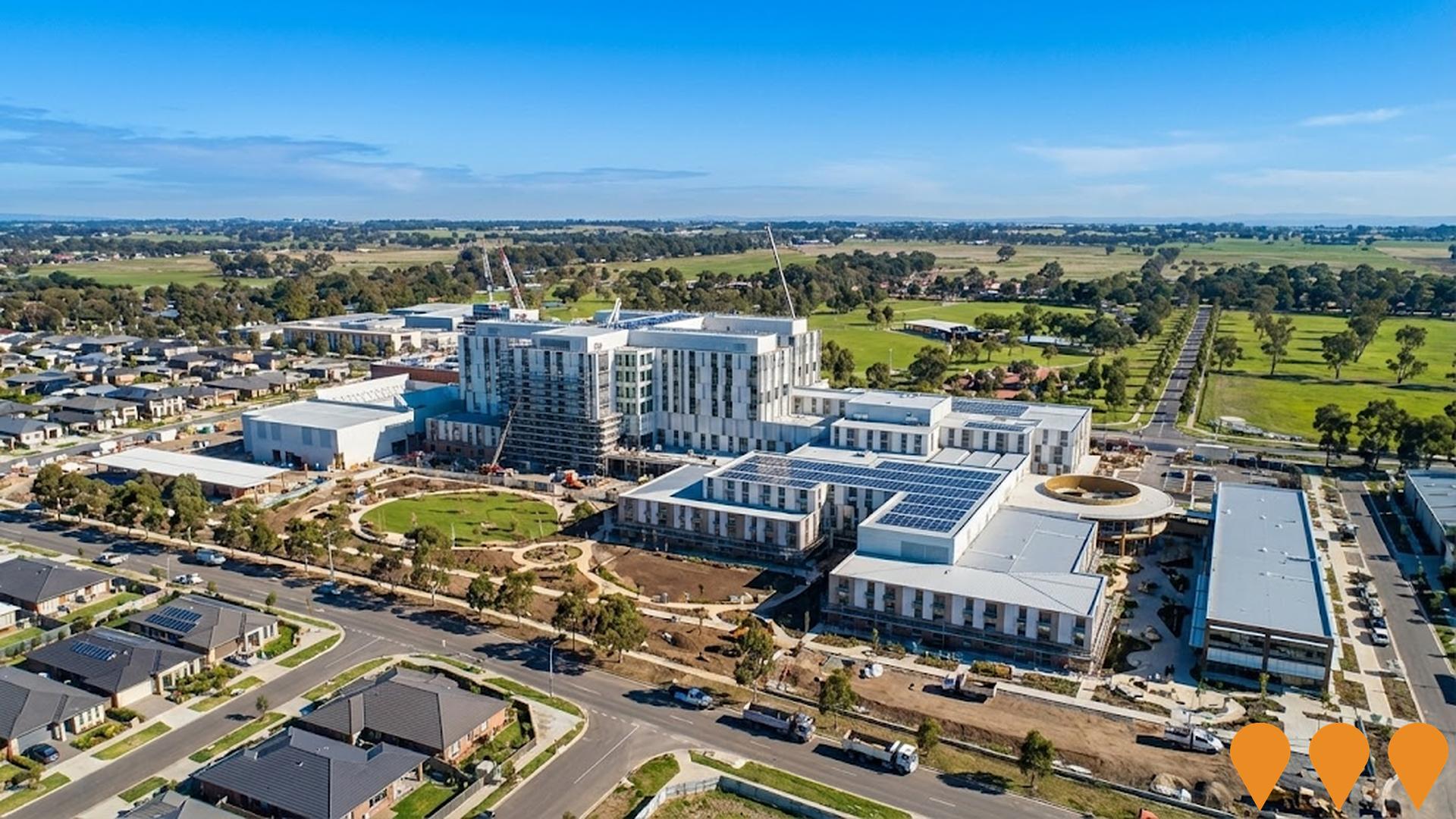
Melton Line Upgrade & Cobblebank Stabling Yard
Major upgrade of the Melton railway line to allow 9-car VLocity trains to operate, including removal of four level crossings (Exford Road, Ferris Road, Coburns Road in Melton and Hopkins Road in Truganina), duplication of 18 km of track between Deer Park West and Melton, a new elevated rail design over the new Melton Station precinct, and construction of a new stabling yard at Cobblebank capable of holding six 9-car VLocity trains with associated signalling, worker facilities, lighting and CCTV.
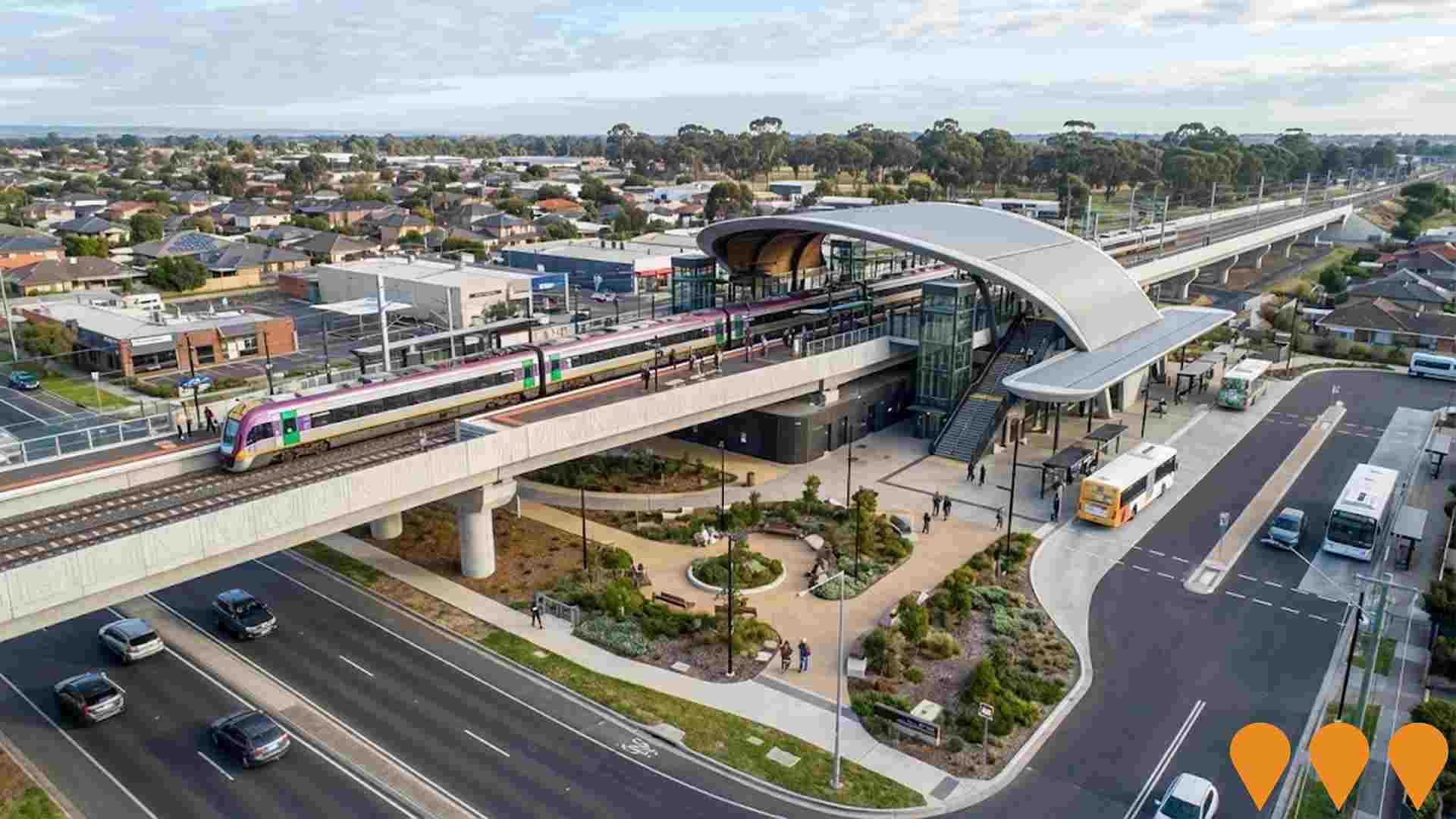
Western Freeway Upgrade (Melton to Caroline Springs)
Major $1 billion upgrade of the 17km section of the Western Freeway between Melton and Caroline Springs. The upgrade is planned to improve safety, freeway access, and road capacity to accommodate future demand. The project will explore options for additional lanes, new and upgraded interchanges, improved walking and cycling paths, traffic signal and street lighting improvements, and public transport facilities. The program business case was completed in December 2024 and provided to government to inform decision-making, recommending a long-term approach and potential staging. Detailed planning work continues in 2025 as the upgrade moves towards construction.
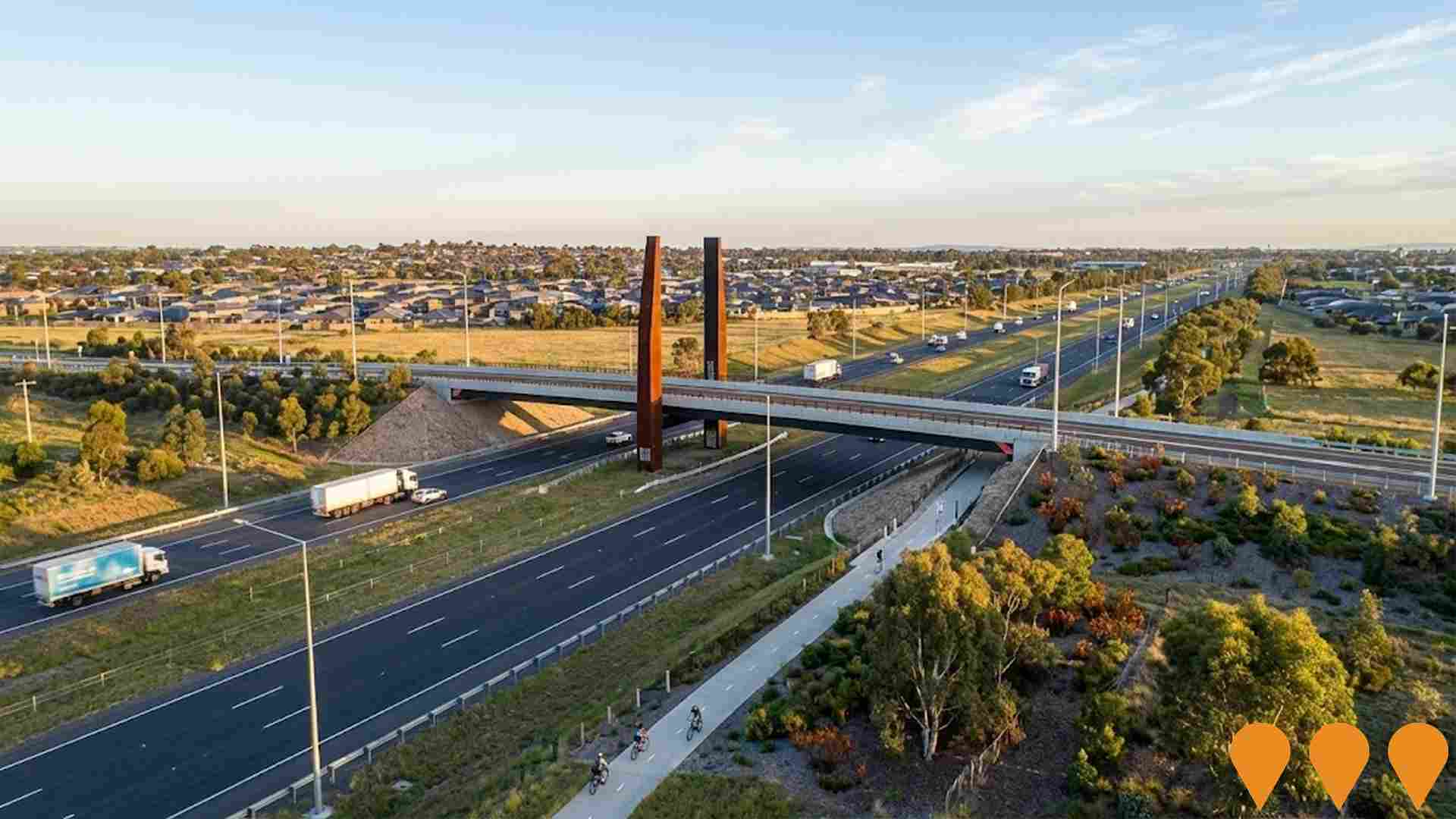
Melton Level Crossing Removal Project
Removal of four level crossings in Melton and Truganina (Coburns Road and Exford Road by elevating the rail over the road, Ferris Road and Hopkins Road by building road bridges over the rail) plus construction of a new premium Melton railway station with four platforms. The project will remove the last remaining level crossings in Melton by 2026 (two years ahead of original schedule), eliminate boom gate downtime, and improve safety and traffic flow for approximately 73,000 vehicles daily.
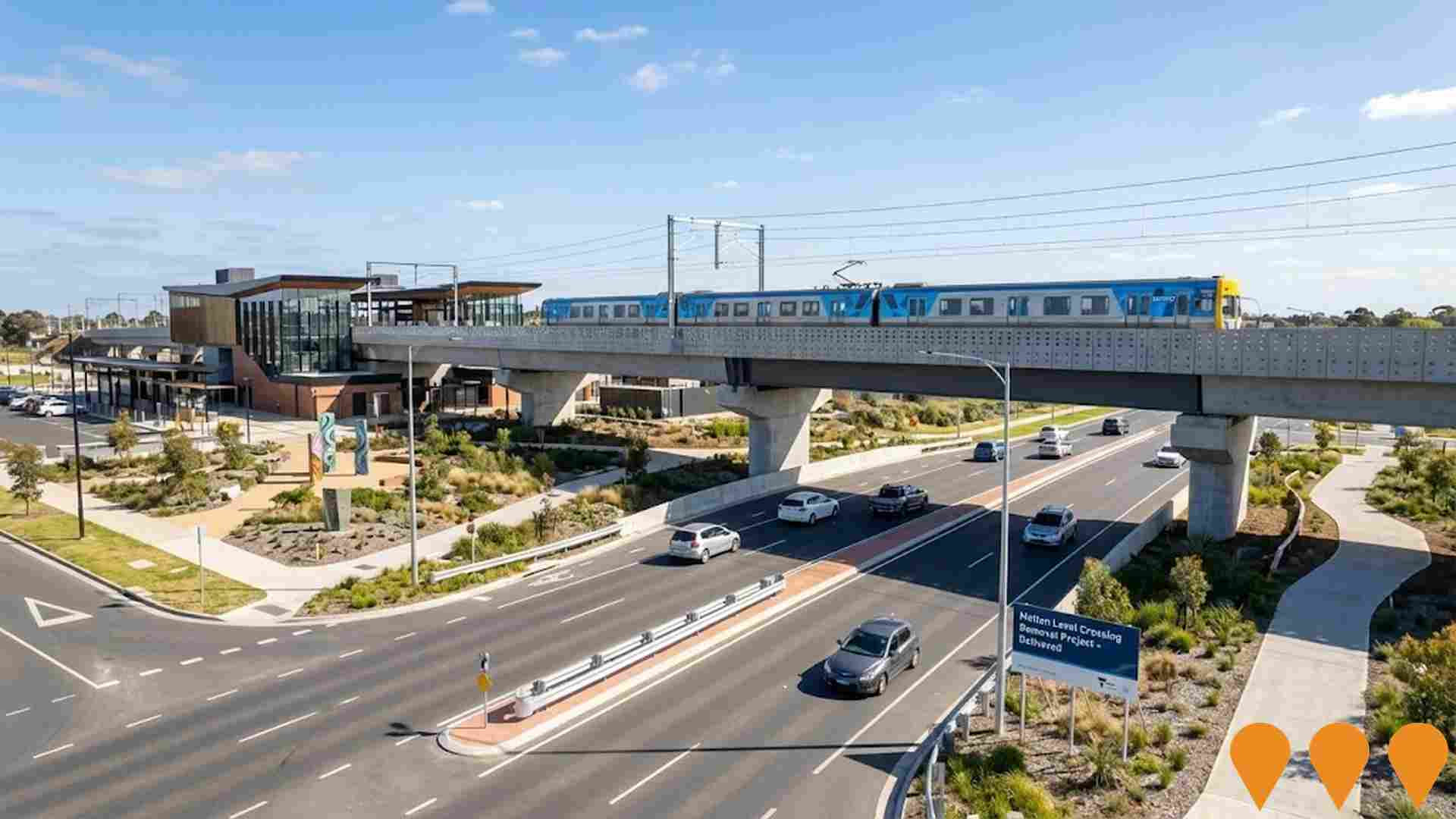
Western Freeway Upgrade - Melton to Caroline Springs
Upgrade of the Western Freeway between Melton and Caroline Springs to an urban freeway standard to improve capacity, safety, and traffic flow. The upgrade is planned to include additional road lanes, new and upgraded interchanges and overpasses, walking and cycling paths, traffic signal improvements, and public transport facilities. A program business case was completed in December 2024, and detailed planning is continuing in 2025.
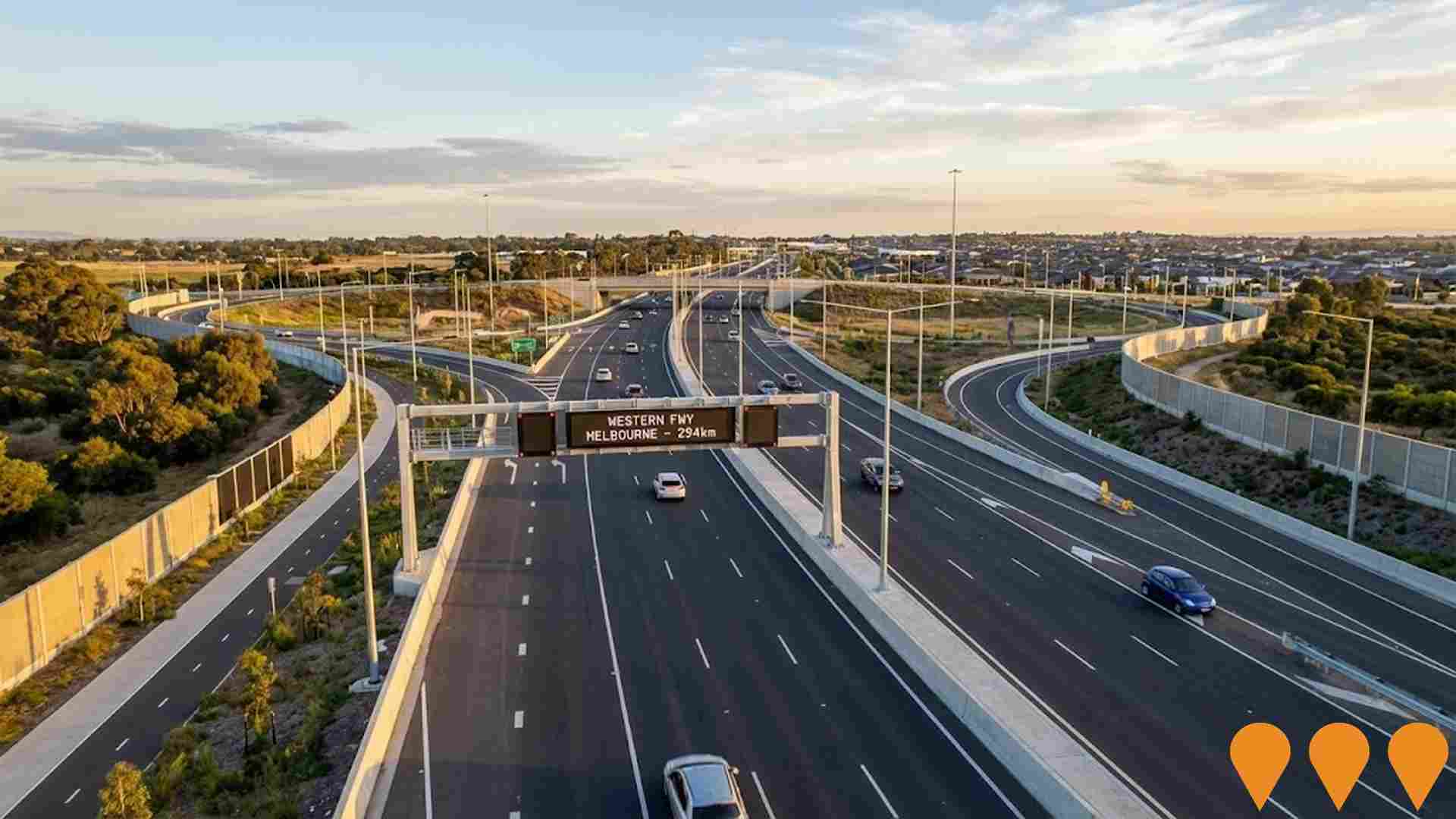
Woodgrove Shopping Centre Expansion and Renewal (Melton)
Multi stage expansion and renewal of Woodgrove Shopping Centre in Melton West, including the major $150m regional mall expansion completed in 2013 and the upgraded outdoor dining precinct and childrens play area that opened in December 2022. The centre now offers more than 150 specialty stores, cinemas and a family focused dining hub, and continues to be planned as a key major activity centre with further value add opportunities and a future Woodgrove Area Plan being progressed by Melton City Council.
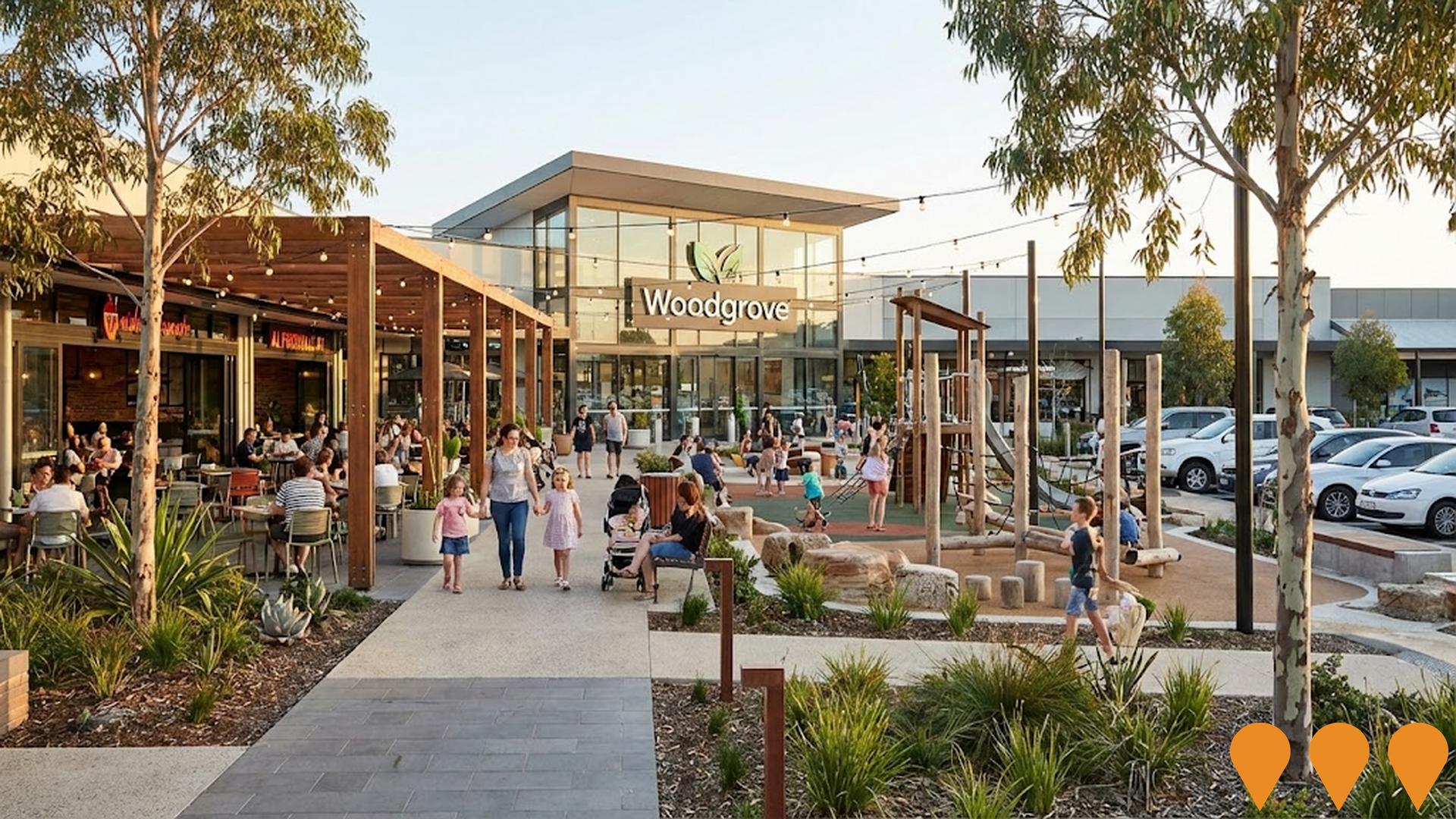
Employment
Employment conditions in Melton face significant challenges, ranking among the bottom 10% of areas assessed nationally
Melton's workforce is balanced across white and blue-collar jobs. The construction sector stands out with a high representation, an unemployment rate of 14.7%, and estimated employment growth of 3.1% over the past year.
As of September 2025, 3,099 residents are employed while the unemployment rate is 10.1% higher than Greater Melbourne's rate of 4.7%. Workforce participation in Melton lags significantly at 45.6%, compared to Greater Melbourne's 64.1%. Leading employment industries among residents include health care & social assistance, construction, and retail trade. The area has a notably high concentration in transport, postal & warehousing, with employment levels at 2.2 times the regional average.
However, professional & technical services are under-represented, with only 3.2% of Melton's workforce compared to 10.1% in Greater Melbourne. The ratio of 0.8 workers per resident indicates a level of local employment opportunities above the norm. Between September 2024 and September 2025, employment increased by 3.1%, while labour force increased by 5.2%, causing the unemployment rate to rise by 1.7 percentage points. In comparison, Greater Melbourne saw employment grow by 3.0%, labour force expand by 3.3%, and unemployment rise by 0.3 percentage points. State-level data from November 25 shows Victoria's employment grew by 1.13% year-on-year, adding 41,950 jobs, with the state unemployment rate at 4.7%. National employment forecasts from May-25 suggest national employment will expand by 6.6% over five years and 13.7% over ten years. Applying these projections to Melton's employment mix suggests local employment should increase by 6.0% over five years and 12.6% over ten years, though this is a simple extrapolation for illustrative purposes and does not account for localised population projections.
Frequently Asked Questions - Employment
Income
Income metrics place the area in the bottom 10% of locations nationally according to AreaSearch analysis
The median taxpayer income in Melton SA2 was $38,748 and the average was $44,095 according to ATO data aggregated by AreaSearch for financial year 2022. This is below the national average of $54,892 (median) and $73,761 (average), as seen in Greater Melbourne. By September 2025, estimates suggest the median income would be approximately $43,460 and the average $49,457, based on a 12.16% growth since financial year 2022. Census data indicates that incomes in Melton fall between the 5th and 6th percentiles nationally for households, families, and individuals. The income bracket of $800 - 1,499 dominated with 30.0% of residents (2,511 people), differing from regional levels where the $1,500 - 2,999 bracket was predominant at 32.8%. Housing affordability pressures were severe in Melton, with only 81.1% of income remaining, ranking at the 5th percentile nationally.
Frequently Asked Questions - Income
Housing
Melton is characterized by a predominantly suburban housing profile, with above-average rates of outright home ownership
In Melton, as per the latest Census evaluation, 83.2% of dwellings were houses, with the remaining 16.8% comprising semi-detached homes, apartments, and other dwelling types. In contrast, Melbourne metropolitan area had 90.9% houses and 9.1% other dwellings. Home ownership in Melton stood at 33.2%, with mortgaged dwellings at 31.0% and rented dwellings at 35.8%. The median monthly mortgage repayment in Melton was $1,300, lower than Melbourne metro's $1,800. Median weekly rent in Melton was $300, compared to Melbourne metro's $351. Nationally, Melton's mortgage repayments were significantly lower than the Australian average of $1,863, and rents were substantially below the national figure of $375.
Frequently Asked Questions - Housing
Household Composition
Melton features high concentrations of lone person households, with a lower-than-average median household size
Family households account for 63.9% of all households, consisting of 23.5% couples with children, 21.1% couples without children, and 17.5% single parent families. Non-family households make up the remaining 36.1%, with lone person households at 33.1% and group households comprising 3.0%. The median household size is 2.4 people, which is smaller than the Greater Melbourne average of 3.0.
Frequently Asked Questions - Households
Local Schools & Education
Educational outcomes in Melton fall within the lower quartile nationally, indicating opportunities for improvement in qualification attainment
The area's university qualification rate is 13.0%, significantly lower than Greater Melbourne's average of 37.0%. This disparity presents both a challenge and an opportunity for targeted educational initiatives. Bachelor degrees are the most common at 9.0%, followed by postgraduate qualifications (2.2%) and graduate diplomas (1.8%). Vocational credentials are prevalent, with 38.7% of residents aged 15+ holding them, including advanced diplomas (10.0%) and certificates (28.7%).
Educational participation is high, with 30.2% of residents currently enrolled in formal education, comprising 11.5% in primary, 7.9% in secondary, and 3.4% in tertiary education.
Frequently Asked Questions - Education
Schools Detail
Nearby Services & Amenities
Transport
Transport servicing is high compared to other areas nationally based on assessment of service frequency, route connectivity and accessibility
Melton's public transport analysis shows 60 active stops operating within the city, all of which are bus services. These stops are served by six different routes that collectively facilitate 4,070 weekly passenger trips. The accessibility to these transport options is rated as good, with residents on average located just 226 meters from their nearest stop.
Across all routes, service frequency averages 581 trips per day, which translates to approximately 67 weekly trips per individual stop.
Frequently Asked Questions - Transport
Transport Stops Detail
Health
Health performance in Melton is a key challenge with a range of health conditions having marked impacts on both younger and older age cohorts
Melton faces significant health challenges, affecting both younger and older age groups. Private health cover stands at approximately 48%, covering around 4,001 people, which is lower than Greater Melbourne's 50.8% and the national average of 55.3%. Mental health issues and arthritis are the most prevalent conditions, impacting 11.2% and 10.1% of residents respectively.
Conversely, 58.4% report having no medical ailments, lower than Greater Melbourne's 73.7%. Melton has a higher proportion of seniors aged 65 and over at 22.4%, with around 1,875 people in this age group compared to Greater Melbourne's 10.1%. Health outcomes among seniors are broadly aligned with the general population's health profile.
Frequently Asked Questions - Health
Cultural Diversity
The level of cultural diversity witnessed in Melton was found to be above average when compared nationally for a number of language and cultural background related metrics
Melton's population was found to be more culturally diverse than most local markets, with 29.9% born overseas and 24.9% speaking a language other than English at home. Christianity was the predominant religion in Melton, accounting for 50.8%. The 'Other' category comprised 1.6%, higher than Greater Melbourne's 0.56%.
Ancestry-wise, Australian (23.8%), English (23.7%) and Other (12.5%) were the top groups in Melton, differing from regional averages of 18.6%, 16.9% and 18.2% respectively. Notably, Maltese (4.2%), Serbian (0.8%) and Samoan (1.1%) groups had varying representations compared to regional figures.
Frequently Asked Questions - Diversity
Age
Melton's population aligns closely with national norms in age terms
The median age in Melton is 39 years, which is higher than Greater Melbourne's average of 37 years and close to the national average of 38 years. Compared to Greater Melbourne, Melton has a notably higher percentage of people aged 65-74 (11.9% locally) but fewer people aged 25-34 (11.6%). Post-2021 Census data shows that the 75-84 age group has grown from 6.1% to 8.6%, while the 25-34 cohort has declined from 13.6% to 11.6%. By 2041, population forecasts indicate significant demographic changes in Melton. The 75-84 age group is expected to grow by 53% (384 people), reaching 1,105 from 720. Residents aged 65 and older are projected to represent 61% of the population growth. Conversely, the 25-34 and 5-14 age groups are anticipated to experience population declines.
